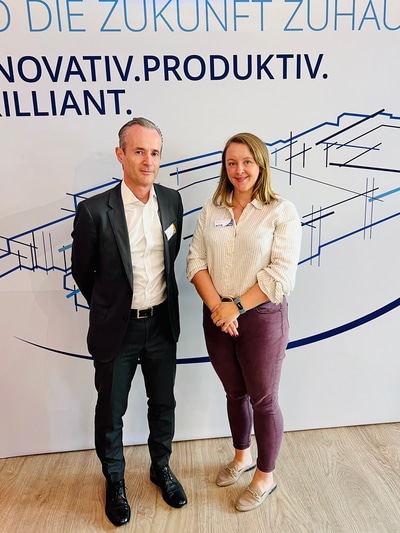- OT
- Industry
- Contact lenses
- “There is still significant unmet need in contact lenses”
“There is still significant unmet need in contact lenses”
Max Wolf, general manager for vision care and contact lenses at Alcon, spoke to OT about sustainability and the future potential of the contact lens industry
09 December 2023
This autumn, contact lens company Alcon revealed its newly expanded manufacturing facility in Grosswallstadt, near Frankfurt.
The site will allow for faster manufacture of new products, meaning innovative new contact lenses will reach patients more quickly than ever before – not just in Europe, but worldwide.
During the launch event, OT caught up with Alcon’s head of vision care and contact lenses, Max Wolf, who in early 2023 returned to the contact lens industry after seven years away.
How has experience outside of this market informed you when coming back into contact lenses?
The market is certainly different seven years later. The products are different. There is a lot of innovation in the market, and that’s great to see. After seven years, there are a lot of new products and a lot of new brands. The manufacturing technology has advanced dramatically over the past seven years, and so have the innovation and the manufacturing sides.
The market had a traditional growth and then had a lull during COVID-19, and now it’s in full rebound. It’s a healthy market at the global level. It continues to grow, so it’s an exciting market for us to be in.
Could you tell us about what has brought us here today, to the expanded Alcon facility?
This location in Grosswallstadt is core for Alcon in contact lenses. It’s the cradle of innovation. We have a significant research and development team on site, and manufacturing team and quality teams, and they work together to develop new products and to develop new manufacturing technology. In contact lenses, you have to bring these two things together to be successful. This is pretty much the centre of innovation for Alcon, as a company that is centred around innovation.
Today specifically, we are celebrating regional expansion, where we have invested $600 million (£478 million) in new manufacturing technology and facilities. We have created 600 new jobs for highly qualified people here, to innovate in the contact lens space.

What is Alcon specifically hoping to achieve with this expansion?
From a business perspective, this expansion allows us to innovate faster, more frequently, and at a higher level. It is critical for our mission, which is to help people see brilliantly.
There is still significant unmet need in contact lenses. We can continue to improve comfort significantly. Presbyopia is a significant unmet need. We have 1.5 billion people around the world with presbyopia. A microscopic fraction of them wear contact lenses, because the solutions today are a compromise in distance and near vision, and they are very complicated. We think there is a significant opportunity for innovation.
We also have a massive opportunity to innovate astigmatism management. Among contact lens wearers, only 20% wear lenses for astigmatism. There’s an opportunity to expand that segment by bringing better solutions that make it easier to create more comfort.
This facility is where that all happens for Alcon. This is where the ideas are born. This is where the products are developed, the manufacturing associated with the technology, and where the product gets developed. Once it works here, in this site in Germany, we take the technology to other manufacturing sites.
This facility is where that all happens for Alcon. This is where the ideas are born
Where do you see contact lens innovation being in five years’ time?
There is going to be continuous improvement of experience and comfort. Clearly, there is room for improvement. We have lots of ideas. Over the next five years, you will probably see advancements in presbyopia management.
What you also hear a lot about in the UK is myopia management. We have a significant population in Asia that is myopic, especially children, and the epidemic is making its way to Europe and to the United States because of lifestyle. So, there is significant unmet need in the myopia space as well. I would say the solutions that are out there today only get us so far. As a leader in eye care, I have the mission and vision to really improve that outcome and help people see better and see brilliantly, including myopes.
Are you seeing any particular challenges within the contact lens category at the moment?

Do you see the expansion of this facility affecting the contact lens market in Europe or worldwide?
The impact of this facility will be on Europe and worldwide, because it will allow us to innovate faster, and bring better solutions, faster, to the market.
It used to be the case in contact lenses that you would first develop the product, and once you had it, you had to innovate and develop the manufacturing. With the facility we have here today and with the technology we have developed, that second step is gone. We now have a manufacturing plant that is developed by us and allows us to produce any and all types of contact lenses, current and future. That means we can bring new products much faster to market. That will certainly benefit wearers in Europe with access to better technology and better solutions.
Does this expansion have any specific sustainability goals?
All our sites have sustainability goals, but what is most important is that as a corporation we have sustainability goals. We have dozens of manufacturing sites. We have a commitment, as a corporation, for carbon neutrality by 2030. We also have a goal to reach zero waste to landfill for every manufacturing site. We have made good progress, but the last single digit percentage that we have to achieve is the hardest, and we are working on that.
More widely, how can the contact lens industry make strides in sustainability?
There is certainly a lot of accountability on the manufacturing side to continue to look at sustainability opportunities, beyond the things that I mentioned – carbon neutrality and zero waste to landfill. We have numerous other initiatives that look at efficiency, whether that’s energy consumption; whether it’s water consumption. These things are less visible, but equally important to really drive impact. That’s a topic for all manufacturers.
You mentioned that you have attended the British Contact Lens Association (BCLA) Clinical Conference and found it valuable in terms of data science. What is a recent data science innovation or development that you have found exciting?
I am biased in that regard. I was very happy about the data being presented at BCLA. It focused on astigmatism management, which is an underserved population in contact lens wearers. Patients who have astigmatism are particularly sensitised to comfort and dry eye, so they require solutions that are even better at comfort.
It was demonstrated at BCLA, with data, how Alcon’s technology Alcon means we are uniquely placed to address comfort and the dry eye needs of astigmatism patients. For us, and for me personally, that was the highlight of BCLA, because it affects contact lens wearers.
Patients who have astigmatism are particularly sensitised to comfort and dry eye, so they require solutions that are even better at comfort
What else is coming up for Alcon?
I can’t disclose everything. But what has been a phenomenal experience coming back to contact lenses, is the seeing that we have launched five new products in two and a half years. That is certainly unprecedented for the industry. We started with Precision 1, Precision 1 for Astigmatism, Dailies Total 1 Astigmatism, and then introduced the first innovation in reusable lenses.
There hasn’t been any innovation in reusable lenses for a long time. We believe there is a significant opportunity – 60% of contract lens wearers are still in reusable lenses, often because they cannot afford a daily lens. We believe that we need to serve all consumers with good solutions. Introducing Total30 was certainly a big step forward. We have just introduced Total30 for Astigmatism, and that is doing particularly well.
We will continue the journey with more innovation, no question. Innovation is the lifeblood of this company. We live and breathe it. That’s why we are in Europe; that’s why we develop technologies here, of the highest standards with the brightest people. It’s important to our strategy and core to our vision.
OT asked Max: in 10 seconds, what do the following mean to Alcon?
Patient care...
Patient care is at the centre of everything we do. We are here to help people see brilliantly, and that is patient care at its essence.
Customer service...
Customer service is mission-critical, because we can only serve patients if the customers have access to the best products and the best service.
Sustainability...
Sustainability is very important around the world in contact lens manufacturing, and for that we have very ambitious goals.
Vision...
Vision is essential for life. As humans, the sense of vision is paramount. We are here to help people have better vision and see brilliantly and transform lives. It is a deeply emotional and very important topic for Alcon.
Future...
The future is bright. There is so much room for innovation and so many great ideas for the future of vision care, contact lenses, and optometry. We will see a lot of innovation over the next decade.



Comments (0)
You must be logged in to join the discussion. Log in